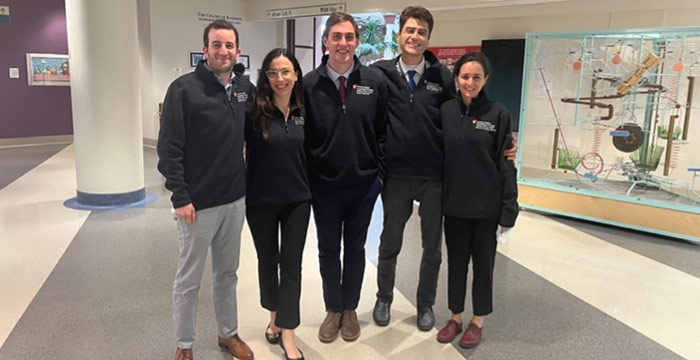Clinical Training Curriculum
 Clinical training in the Hematology and Oncology Fellowship at University Hospitals Cleveland Medical Center, in collaboration with Case Western Reserve University, includes clinical experiences at various clinical training sites, including:
Clinical training in the Hematology and Oncology Fellowship at University Hospitals Cleveland Medical Center, in collaboration with Case Western Reserve University, includes clinical experiences at various clinical training sites, including:
- University Hospitals Cleveland Medical Center
- University Hospitals Seidman Cancer Center
- MetroHealth Medical Center
- The Louis Stokes Cleveland VA Medical Center
The clinical training rotation at MetroHealth and the Louis Stokes Cleveland VA Medical Center encompass both hematology and oncology consultations.
Fellow rotations will be focused in subspecialty disease teams at UH Seidman Cancer Center, our flagship academic medical center, are distributed between:
- Inpatient Hematology Consults
- Malignant Hematology and Stem Cell Transplant Disease Team
- Thoracic Malignancies Disease Team
- Gastrointestinal Malignancies Disease Team
- Genitourinary Malignancies Disease Team
- Breast Malignancies Disease Team
During disease team blocks, fellows act as full members of the team, caring for patients both inpatient and outpatient, participating in teams’ research protocol meetings, and presenting cases at multidisciplinary tumor boards. Solid tumor disease team blocks are designed to distribute additional administrative time, to allow fellows to explore scholarly interests within their team.
On the Malignant Hematology and Stem Cell Transplant disease team, fellows care directly for patients undergoing stem cell transplants, but also for new diagnoses of hematologic malignancies. Fellows should be able to see patients from diagnosis through transplant.
Fellowship Tracks
At the end of their first year of training, fellows should declare a particular track: Clinical, Academic or Clinician Scientist.
The Clinical Track is for fellows intending to pursue a primarily clinical career such as a future in community oncology. During the fellow’s 3rd year, they will continue to rotate through disease teams, with additional focus on elective teams in order to maximize clinical expertise.
The Academic Track is our most popular track for fellows pursuing careers in clinical research, clinical trials expertise, and/or medical education. The goals of the academic track are to ensure sufficient, broad exposure for learning and board eligibility, but also an opportunity to focus on a specific subdiscipline and prepare for a career as a subspecialist in an academic setting. The 3rd year of training may be primarily focused on a specific disease specialty to prepare fellows to transition to an attending with a subspecialist focus.
The Clinician Scientist Track is for fellows pursuing primary research careers. After completion of core clinical rotations, fellows on this track maintain only a continuity clinic and dedicate additional time to laboratory or other translational research. Fellows matched via the ABIM recognized “Research Pathway” that encompasses accelerated residency and fellowship training are always considered enrolled on this track. Other fellows may declare for this track, but a letter of support from a primary research mentor indicating sufficient laboratory support is required. Research efforts should lead to the submission of grants during fellowship for funding to further support an independent research career (e.g. a K-level award).


